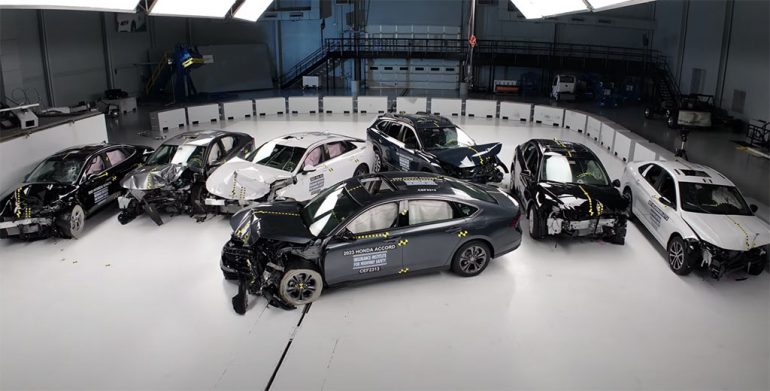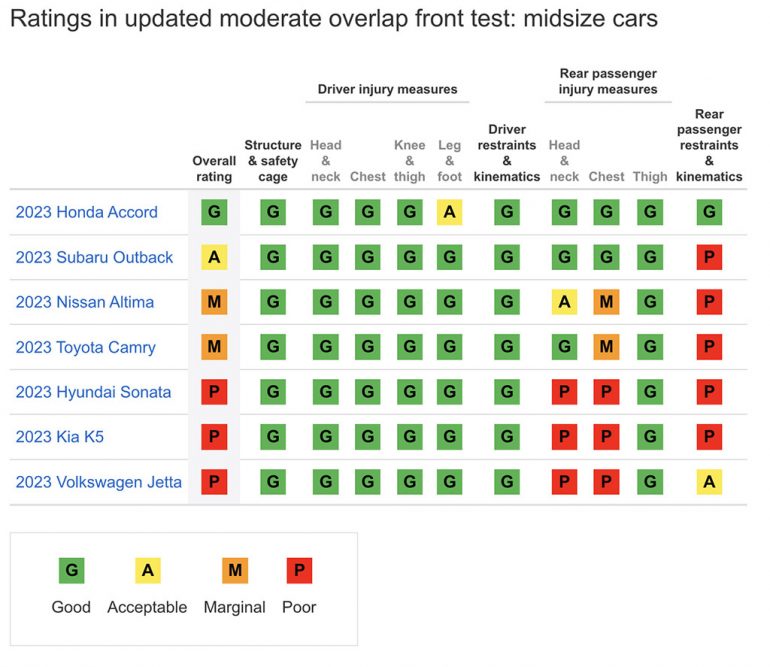
The new Honda Accord has established its dominance in ensuring passenger safety within the midsize car segment, outpacing its competitors by a significant margin.
In recent crash data released by the Insurance Institute for Highway Safety (IIHS), the Honda Accord stands out as the only midsize sedan to achieve the highest overall rating of “good” for rear-seat passenger safety. This accolade places it ahead of six other midsize sedans evaluated. The IIHS rankings reveal that the Subaru Outback follows suit with an “acceptable” rating, while the Nissan Altima and Toyota Camry settle for a “marginal” rating. Unfortunately, the Hyundai Sonata, Kia K5, and Volkswagen Jetta are deemed as subpar with a “poor” rating.
IIHS President David Harkey stated in the report that in the majority of midsize cars tested, the rear dummy experienced a problematic scenario where it slid forward beneath the lap belt, a phenomenon known as “submarining.” This occurrence can result in the lap belt riding up from the pelvis onto the abdomen, thereby increasing the risk of internal injuries. The three vehicles that received poor ratings displayed measurements indicating probable injuries to the head, neck, chest, and excessive belt forces in the rear dummy.
The IIHS recently introduced a new crash test called the “moderate overall front crash test,” which measures the impact when the front corners of two vehicles traveling in opposite directions collide at 40 mph. This new test highlighted that in newer vehicles, rear-seat passengers wearing seatbelts face a higher risk of fatal injury than those seated in the front. Furthermore, the IIHS now employs a crash test dummy the size of a small woman or a 12-year-old child in the rear seats to more accurately represent the average passenger profile.
To receive a good rating, a vehicle must exhibit minimal risk of injury to the head, neck, chest, or thigh, as observed with the second-row dummy, and maintain a proper position during the crash without experiencing submarining. The Honda Accord, backed by IIHS data, demonstrated a lack of heightened injury risk and effective control of the dummy’s motion by the rear restraints.

In contrast, the Altima and Camry, both rated as marginal, showcased submarining of the rear dummy beneath the lap belt, accompanied by the shoulder belt moving toward the dummy’s neck. The poor-rated Sonata, K5, and Jetta displayed measurements indicating potential head, neck, and chest injuries, as well as excessive belt forces. In the K5 and Sonata, the rear shoulder belt also shifted towards the neck.
The 2023 Honda Accord, priced at just under $27,300, is all-new for the model year, positioning itself slightly higher in terms of cost compared to its rivals, with the exception of the Subaru Outback, priced at $28,895. Despite the Accord’s excellence, the midsize sedan market has been diminishing both in the U.S. and globally, as consumers gravitate towards crossovers and smaller SUVs. The shift is evident in the rise of SUV sales, reaching a market share of 41.3% globally and 54% in the U.S. for all light vehicles sold.
However, this trend towards SUVs and crossovers raises concerns among safety advocates. These larger vehicles tend to pose a greater danger to pedestrians and cyclists due to their increased size and weight. A study published in the Journal of Safety Research highlighted that while SUVs and trucks accounted for only 26.1% of pedestrian and cyclist collisions, these incidents resulted in 44.1% of all fatalities.

Mike Floyd is a finance executive by trade and a car enthusiast at heart. As a CFO with a keen eye for detail and strategy, Mike brings his analytical mindset to the automotive world, uncovering fresh insights and unique perspectives that go beyond the surface. His passion for cars—especially his favorite, the Porsche 911, fuels his contributions to Automotive Addicts, where he blends a love for performance and design with his professional precision. Whether he’s breaking down industry trends or spotlighting emerging innovations, Mike helps keep the site both sharp and forward-thinking.
